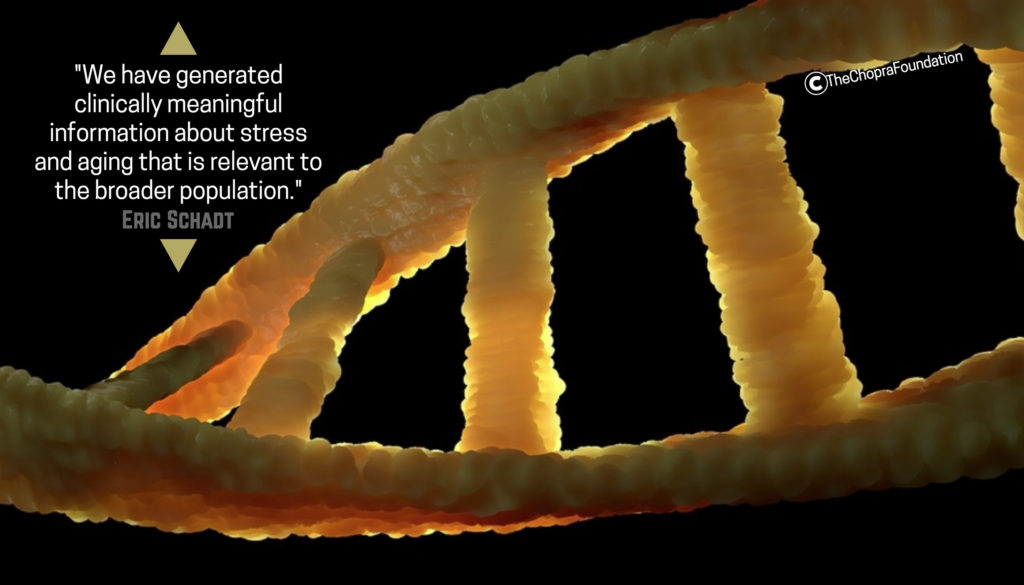
Rustum Roy Spirit Award Recipient, Eric Schadt, interviewed by Reuters. Read: Just Going on Vacation May Change Gene Activity
Source: http://www.nature.com/tp/journal/v6/n8/full/tp2016164a.html

Rustum Roy Spirit Award Recipient, Eric Schadt, interviewed by Reuters. Read: Just Going on Vacation May Change Gene Activity
Source: http://www.nature.com/tp/journal/v6/n8/full/tp2016164a.html
 By Deepak Chopra, MD, Rudolph E. Tanzi, PhD
By Deepak Chopra, MD, Rudolph E. Tanzi, PhD
Genetics may be on the verge of solving a very complex question in a revolutionary but quite simple way. The question is, What does it take to be happy? The question never goes away. It hangs over our heads every day. The possible answers are many, but they follow two general trends whose results, frankly, have been disappointing. One trend is psychological, holding that happiness is an emotional state. The other trend is philosophical, holding that happiness is a mental state. When someone is unhappy, psychologists aim to improve their mood, largely by addressing anxiety, depression, and various psychological wounds from the past. A philosopher, on the other hand, would examine the underlying idea of happiness itself and why it is or isn’t feasible. In the end, happiness is all about health and wellbeing.
Yet after thousands of years of deep thinking and a hundred years of psychotherapy, the condition that the vast majority of people find themselves in is marked by total confusion. We muddle through on a wobbly combination of wishful thinking, hope, bouts of high and low spirits, denial, family ties, love, distraction, and the constant pursuit of external pleasures, as if happiness can be cobbled together more or less randomly.
By Deepak Chopra, MD and Rudolph E. Tanzi, PhD
 Human beings are unique in the scenario of life on Earth–that much is obvious. We are guided by awareness, and to implement our wishes, dreams, and inventions, the higher brain (chiefly the cerebral cortex) has evolved to extraordinary proportions. Although classical Darwinism is mindless, and staunchly defended as such by strict materialists, Homo sapiens is no longer caught in the clutches of natural selection. As we saw in the first post of this series, human society is very different from the state of nature. Chimpanzees don’t get their food at the grocery store, and we don’t get ours by fighting with rivals in the treetops.
Human beings are unique in the scenario of life on Earth–that much is obvious. We are guided by awareness, and to implement our wishes, dreams, and inventions, the higher brain (chiefly the cerebral cortex) has evolved to extraordinary proportions. Although classical Darwinism is mindless, and staunchly defended as such by strict materialists, Homo sapiens is no longer caught in the clutches of natural selection. As we saw in the first post of this series, human society is very different from the state of nature. Chimpanzees don’t get their food at the grocery store, and we don’t get ours by fighting with rivals in the treetops.
By Deepak Chopra, MD, and Jordan Flesher, BA Psychology
Everyone has had a meaningful coincidence happen to them–the classic example is thinking of someone’s name and the next minute that person telephones, or seeing an unusual word in your mind’s eye and then running across that word the next time you open a book. It’s spooky that the outside world can be synchronized with our inner world, yet the bigger question is about reality itself. Synchronicity, the common term for meaningful coincidences, doesn’t tend to change anyone’s life–but it could.
Instead of passing off such experiences as incidental, what if synchronicity is telling us something crucial about reality, linking the inner and outer worlds because in the long run, they are completely unified? If inner=outer, a tremendous shift in the Western materialistic worldview would follow. Let’s see how far the trail of clues takes us.
By Deepak Chopra, MD, and Jordan Flesher
Over the past decade, the hunt for genetic connections with behavior as intensified. For any experience, there must be a physical activity in the brain—otherwise, the experience has no basis. Using this irrefutable assumption, researchers have looked for the seat of anger, criminal behavior, gender identification, the sense of self, and many other aspects of human nature. This includes spirituality. Where is God in the brain? To many neuroscientists, that’s not only a valid question but the only one worth asking, insofar as spiritual experiences have any reality.
Now we are hearing about “God in the genes,” as genetics overtakes neuroscience for the top spot in explaining the roots of human experience. Where the brain operates only in the present, genetics peers deep into the past. A geneticist would want to know what evolutionary advantage early humans got from being spiritual—in the broadest sense of the word—that led to a better chance to survive. This whole line of inquiry, whether we’re taking about the brain or our genes, makes sense if you are a materialist. But it runs the danger of saying that spirituality is only about the physical side of the experience, as if music could never be discussed except by looking at pianos and radios, the physical side of delivering the musical experience.